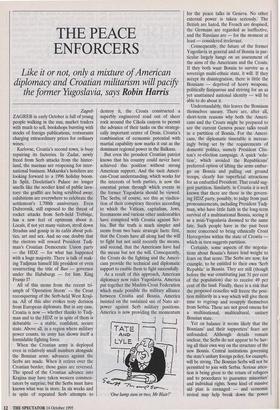THE PEACE ENFORCERS
Like it or not, only a mixture of American diplomacy and Croatian militarism will pacify
the former Yugoslavia, says Robin Harris Zagreb ZAGREB in early October is full of young people walking in the sun, market traders with much to sell, bookshops bursting with stocks of foreign publications, restaurants charging extraordinary prices for ordinary wines.
Karlovac, Croatia's second town, is busy repairing its factories. In Zadar, newly freed from Serb attacks from the hinter- land, the marinas are reopening for inter- national business. Makarska's hoteliers are looking forward to a 1996 holiday boom. In Split, Diocletian's Palace no longer smells like the seedier kind of public lava- tory: the graffiti are being scrubbed away; exhibitions are everywhere to celebrate the settlement's 1,700th anniversary. Even Dubrovnik, still exposed to the threat of rocket attacks from Serb-held Trebinje, has a new feel of optimism about it. Locals, if not yet many visitors, stroll down Stradun and gossip in its cafés about poli- tics, art and sex. And no one doubts that the electors will reward President Tudj- man's Croatian Democratic Union party — the HDZ — for what has happened with a huge majority. There is talk of mak- ing Tudjman himself life president or even resurrecting the title of Ban — governor under the Habsburgs — for him. King Franjo I?
All of this stems from the recent tri- umph of 'Operation Storm' — the Croat reconquering of the Serb-held West Kraji- na. All of this also evokes testy derision from European diplomats. But in any case, Croatia is now — whether thanks to Tudj- man and to the HDZ or in spite of them is debatable — a stable, confident, secure state. Above all, in a region where military power counts, its army has shown itself a formidable fighting force.
When the Croatian army is deployed even in relatively small numbers alongside the Bosnian army, advances against the Serbs are made. When it retires over the Croatian border, those gains are reversed. The speed of the Croatian advance into Krajina may have taken western commen- tators by surprise; but the Serbs must have known what was in store. In six weeks and in spite of repeated Serb attempts to destroy it, the Croats constructed a superbly engineered road out of sheer rock around the Cikola canyon to permit the advance of their tanks on the strategi- cally important centre of Drnis. Croatia's combination of economic potential with martial capability now marks it out as the dominant regional power in the Balkans.
But even the proudest Croatian patriot knows that his country could never have achieved this position without strong American support. And the tacit Ameri- can-Croat understanding, which works for the interests of both parties, is now the essential prism through which events in the former Yugoslavia should be viewed. The Serbs, of course, see this as vindica- tion of their conspiracy theories according to which the Vatican, capitalism, Jews, freemasons and various other undesirables have conspired with Croatia against Ser- bia. But the truth is much simpler and stems from two basic strategic facts: first, that the Croats have all along had the will to fight but not until recently the means, and second, that the Americans have had the means but not the will. Consequently, the Croats do the fighting and the Ameri- cans provide the technical and diplomatic support to enable them to fight successfully.
As a result of this approach, American diplomacy now rules Yugoslavia. America put together the Muslim-Croat Federation which made possible the military alliance between Croatia and Bosnia. America insisted on the sustained use of Nato air- power against Serb military positions. America is now providing the momentum `One lump sum or two, Mr Blair?' for the peace talks in Geneva. No other external power is taken seriously. The British are hated, the French are despised, the Germans are regarded as ineffective, and the Russians are — for the moment at least — considered irrelevant.
Consequently, the future of the former Yugoslavia in general and of Bosnia in par- ticular largely hangs on an assessment of the aims of the Americans and the Croats. If they both want Bosnia to survive as a sovereign multi-ethnic state, it will. If they accept its disintegration, there is little the Bosnians — deprived of heavy weapons, politically fissiparous and striving for an as yet unattained national identity — will be able to do about it.
Understandably, this leaves the Bosnians themselves uneasy. There are, after all, short-term reasons why both the Ameri- cans and the Croats might be prepared to see the current Geneva peace talks result in a partition of Bosnia. For the Ameri- cans, the diplomatic timetable is increas- ingly being set by the requirements of domestic politics, namely President Clin- ton's re-election campaign. A quick 'solu- tion', which avoided the Republicans' preferred option of lifting the arms embar- go on Bosnia and pulling out ground troops, clearly has superficial attractions for an embattled President. That could sug- gest partition. Similarly, in Croatia it is well known that there are those in the govern- ing HDZ party, possibly, to judge from past pronouncements, including President Tudj- man, who have little faith in the long-term survival of a multinational Bosnia, seeing it as a mini-Yugoslavia doomed to the same fate. Such people have in the past been more concerned to bring ethnically Croat Hercegovina within the state of Croatia which in turn suggests partition.
Certainly, some aspects of the negotia- tions about Bosnia's future lend weight to fears on that score. The Serbs are now, for example, to be entitled to their own 'Serb Republic' in Bosnia. They are still (though before the war constituting just 31 per cent of the population) due to receive 49 per cent of the land. Finally, there is a risk that the proposed ceasefire will freeze the posi- tion militarily in a way which will give them time to regroup and resupply themselves from Serbia. These are not good omens for a multinational, multicultural, unitary Bosnian state.
Yet on balance it seems likely that the Bosnians' and their supporters' fears are unfounded. Although details remain unclear, the Serbs do not appear to be hav- ing all their own way on the structure of the new Bosnia. Central institutions governing the state's unitary foreign policy, for example, will be strong. The Bosnian Serbs will not be permitted to join with Serbia. Serious atten- tion is being given to the return of refugees and to procedures to guarantee minorities' and individual rights. Some kind of massive aid plan is envisaged — and economic revival may help break down the power of Pale's clique of political gangsters.
But the crucial determinant is what Washington and Zagreb really want from it all. And the truth seems to be that, what- ever the temptations to the contrary, both now want Bosnia to survive as a state, and will ensure that it does. For the Ameri- cans, domestic and international political pressures will help force this. If the Clin- ton administration fails to secure a formu- la for a genuinely independent Bosnia it will be in deep trouble with American opinion — Democrat as well as Republi- can. Just as important, the Americans are under intense pressure from the Islamic countries not to allow the division or emasculation of Bosnia — and American policy-makers are far more sensitive to such pressure than their introverted Euro- pean counterparts.
In Zagreb, as in Washington, there is also now a clear recognition of the impor- tance of the military alliance with Bosnia and the need to preserve that country as a sovereign state. President Tudjman's untactful disquisitions on Balkan identity problems will doubtless continue to ripple the diplomatic water. But no one who seri- ously understands Croatian thinking now believes that a division of the spoils with the Serbs is on Zagreb's agenda. The rea- sons for this are obvious. On the one hand, the Croats are strong enough to stand up to the Serbs without having to broker deals at others' — in this case the Bosnians' expense. On the other, the Muslim-Croat Federation in Bosnia and the confedera- tion between the Croatian and Bosnian states have, in practice, largely satisfied the Croat Hercegovinian lobby's concerns to achieve a good deal for their native Hercegovina.
Under existing arrangements, Croat Hercegovina (`Herceg-Bosna) is for all practical purposes already a Croat mini- state and will remain so; there is conse- quently little more that the Hercegovinian lobby wishes to achieve that distinguishes it from the rest of the Croatian political class. Now the desire of all of that class is to keep Bosnia as a stable buffer state sep- arating Croatia from the Serbs. This may still lead to some overbearing Croat behaviour on occasion, and this in turn may stir latent Bosnian paranoia, but it does effectively rule out any Croat attempt to divide Bosnia and indeed requires that effective Croatian military support be given on a continuing basis to the Bosnian government.
The political will and interests exist among the two decisive players — Ameri- ca and Croatia — therefore, for an out- come to the Bosnian war that upholds the moral principles that the West has, with varying degrees of sincerity supported namely that borders must not be changed by force, that aggression should not pay and that human rights, in particular the rights of refugees to return home, should be respected.
Travelling down through the re-occupied western Krajina by road is a slow business. Unprofor lorries, taking their unloved and unwanted occupants away from the zones they failed to police and the people they failed to protect, clog returning civilian traffic to a standstill. Burnt-out Serb tanks, burnt-down Croat (and sometimes Serb) houses and — cordoned off, but marked by votive lights and candles — the sites of destroyed Catholic churches and suspected Croat mass graves are to be found along the route. Just outside Drnis, the great Croat sculptor Ivan Mestrovic's mausoleum has been desecrated, the old man's body dug up and disposed of who knows where. The Serbs have departed, the Croats have not returned. An air of silent emptiness hangs over the place.
For all their faults — overblown rhetoric and underperformed obligations — the Americans, one feels, would not have presided over this if they had been directly involved at the beginning. Some obscure moral instinct which jaded European pow- ers lack would have forced them to act. The fact that the Americans have belatedly recovered the will — and in Croatia found the practical means — to do so will per- haps ensure that the horror of the last four years is not repeated.











































































 Previous page
Previous page